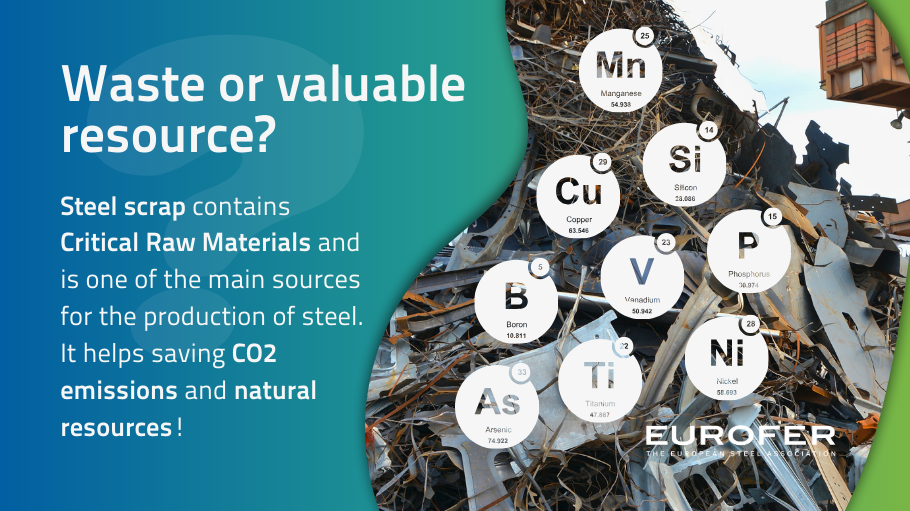Missed opportunities in securing EU scrap supply risk delaying industrial decarbonisation, warns EUROFER
Date
Sections

Brussels, 13 December 2023 – The exclusion of ferrous scrap from the Critical Raw Materials Act (CRMA) and specific provisions in the Waste Shipment Regulation (WSR) recently agreed risk jeopardising sufficient supply and quality of this valuable secondary material, which is essential for the decarbonisation of the steel industry. Despite some progress made to improve recycling and export criteria, an important way forward to ensure green steel and resilient cleantech value chains made in Europe is to recognise ferrous scrap as secondary strategic raw material and include it in all relevant legislation, says the European Steel Association. “Ferrous scrap plays a fundamental role to meet the EU’s ambitious climate and circularity targets, impacting not only the European steel industry’s transition but also the overall cleantech value chain development. Scrap is not just a pile of ferrous waste, but a valuable resource as it contains also primary critical raw materials such as nickel, tungsten or titanium which are crucial for producing a wide range of applications and technologies for both the green and digital transition”, pointed out Axel Eggert, Director General of the European Steel Association (EUROFER). “We regret that the list of strategic secondary raw materials including scrap which was proposed by the Parliament was not retained in the final text of the Critical Raw Materials Act, nor scrap-specific measures were included in the Waste Shipment Regulation. This will further challenge the decarbonisation efforts of the European steel industry and the EU as a whole”, he added. Ferrous scrap is already considered a scarce, hence strategic, resource, and over 40 countries already apply trade restrictions. For every tonne of carbon steel scrap recycled, a saving of 1.5 tonnes of CO2 is achieved, and in case of stainless-steel scrap this saving is even higher, reaching roughly 5 tonnes of CO2. Moreover, it contains other critical raw materials such as manganese, vanadium, tungsten, yttrium, niobium, titanium, and so on, which can be recycled as well and are essential for high tech products and cleantech innovations. However, ferrous scrap is currently the most exported type of waste from the EU – 19.5 Mt in 2021, equal to 59% of all EU waste exports, according to Eurostat. According to projections of scrap availability and consumption patterns in the future - based on the needs of the transformation the European steel industry will undergo by 2030-2050 -, there will not be sufficient scrap available to cover the EU low-carbon steel production needs. Some positive developments, such as potential increases in collection, sorting, and recycling of waste, and possible incentives for recycling, along with shortened timelines for updating the Critical Raw Materials list, reflecting a commitment to sustainable practices in the broader context of the Circular Economy Action Plan, are a first step. Improvements in monitoring, environmentally sound management criteria and audit obligations for waste shipments are positive, however penalties to ensure enforcement have been watered down. “The transition towards a low-carbon and circular economy is accompanied by the growing importance of secondary raw materials. Resilience always comes from within. This is why, if we want to ensure resilient cleantech value chains made in Europe, it is imperative to acknowledge the crucial role of ferrous scrap among strategic secondary raw materials and in all relevant EU legislation”, concluded Mr. Eggert. Contact About the European Steel Association (EUROFER) The European Steel Association is recorded in the EU transparency register: 93038071152-83. About the European steel industry Steel is the most versatile industrial material in the world. The thousands of different grades and types of steel developed by the industry make the modern world possible. Steel is 100% recyclable and therefore is a fundamental part of the circular economy. As a basic engineering material, steel is also an essential factor in the development and deployment of innovative, CO2-mitigating technologies, improving resource efficiency and fostering sustainable development in Europe.
-
Notes for editors
Lucia Sali, Spokesperson and Head of Communications, +32 2 738 79 35, (l.sali@eurofer.eu)
EUROFER AISBL is located in Brussels and was founded in 1976. It represents the entirety of steel production in the European Union. EUROFER members are steel companies and national steel federations throughout the EU. The major steel companies and national steel federation of Turkey and the United Kingdom are associate members.
The European steel industry is a world leader in innovation and environmental sustainability. It has a turnover of around €130 billion and directly employs around 306,000 highly-skilled people, producing on average 152 million tonnes of steel per year. More than 500 steel production sites across 22 EU Member States provide direct and indirect employment to millions more European citizens. Closely integrated with Europe’s manufacturing and construction industries, steel is the backbone for development, growth and employment in Europe.
